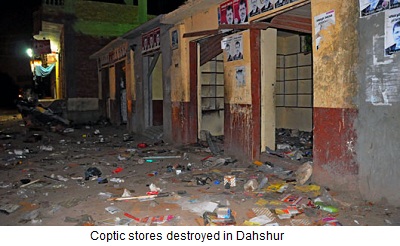
Dozens of Copts protested in front of the Presidential Palace in Heliopolis, Cairo, on Sunday against the forced migration of Christians from Dahshur, Giza. The protesters chanted: "Where is Dahshur's right?" and held banners with the slogans: "Where is justice? Why did they kick out the Christians?" and "What does Morsi want? Does he want us to kiss his feet?"
The Christians left Dahshur village after clashes that started last week, when a Coptic launderer burned the shirt of one of his Muslim customers when he was ironing it. The fight escalated and one Muslim, Moaz Mohamed Mohamed, got seriously wounded. All accounts agree that the injured was a passerby, and that the fight started as a regular not sectarian argument. The village used to boast of a happily integrated Muslim and Christian community with growing business prospects that encouraged Copts to move there from neighbouring villages.
The fight turned sectarian when the Muslim man died in hospital on Wednesday 1 August. Then new clashes erupted, leaving nine people, including the Director of Criminal Investigations of Giza Security Directorate Mahmoud Farouq, injured. This is also when all Christian families felt threatened and were pressured to leave their hometown by everyone from the police — who reportedly advised them to go, claiming they would not be able to protect them — to neighbours that promised to protect their properties, and even the local priest, who urged them to take their children and flee. Protester Nader Magdy told the Al-Ahram Arabic website: "I had to leave my village because they threatened us with murder and they said any Christian will be shot dead."
Several houses belonging to Christian residents in addition to two businesses in the town were burned down by crowds angered by Mohamed's death. There was also a failed attempt to set the Mary Girgis Church on fire before security forces used tear gas to disperse angry crowds. A special security team was appointed to secure the church and Copts' homes in the village.
According to the Egyptian Initiative for Personal Rights (EIPR), who were monitoring the situation from the beginning and released a report 31 July urging the police to protect citizens and properties, "A mob tried to attack the local Mari Girgis Church, but a group of Muslims prevented them and protected the church until a police force came and dispersed the crowd. The mob later burned a Christian man's house and police failed to intervene." The report warned against escalating violence and collective punishment of citizens who are not part of the argument. It also warned that in similar cases the police have remained passive. What EIPR warned against then happened. Police failed to protect Coptic citizens and properties and watched as violence escaled and hundreds fled their homes.
President Morsi's office has condemned the attacks. His spokesman Yasser Ali said on Saturday that Dahshur's Copts have not been forced to migrate following recent clashes, but did so out of fear for future clashes. Ali also said that Copts who have suffered material damages will be compensated, and that Morsi contacted Al-Azhar's grand imam and the acting Coptic pope to intervene to end the crisis.
Also the Islamist group Al-Jamaa Al-Islamiya released a statement on Friday stating that it is unlawful to assault the lives and properties of Christians under any circumstances.
Apparently, however, the problems in Dahshur seem to be far from over. Egypt Independent reported that a reconciliation session will be held soon. Sessions like that were traditionally held in the Mubarak era when sectarian clashes broke out. They usually did not solve the problems, as both sides used to be put under pressure to agree to terms that had been laid out beforehand by the authorities.


.jpg)


No comments:
Post a Comment